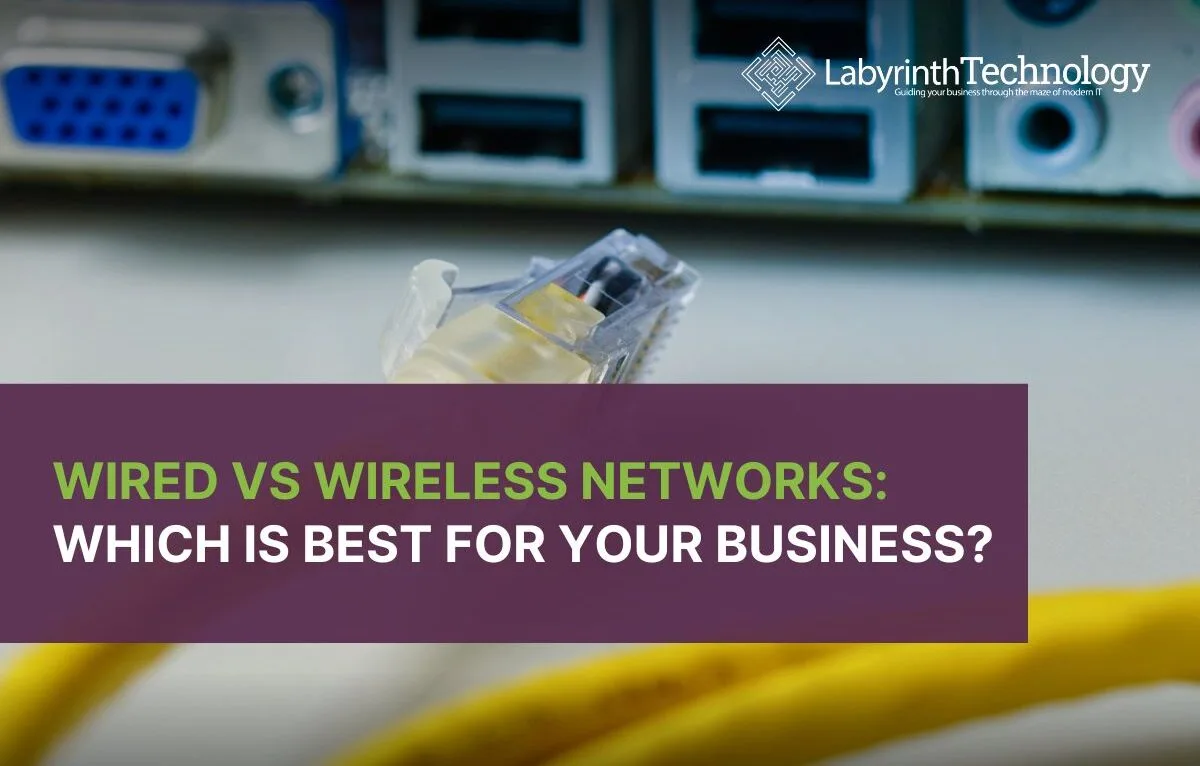
The debate between wired and wireless networks is as old as modern networking itself. Businesses, large and small, constantly face the decision of whether to rely on traditional wired connections or embrace the convenience of wireless solutions. While the appeal of a cable-free office is undeniable, the reality is that both wired and wireless connections have their place in business environments.
So, how do you choose the right setup for your organisation? The answer isn’t always straightforward, and in many cases, a tailored, expert-driven approach is required to ensure optimal performance.
At Labyrinth Technology, we believe that making the right choice requires more than just picking the most popular option. Every business is different, and the network connections that work best for one might be completely unsuitable for another. That’s why understanding the advantages and drawbacks of each is essential before making an informed decision.
A wired network relies on physical Ethernet cables to connect computers, servers, and other devices. It provides a stable, high-speed connection and is generally preferred in environments where security and consistency are key. A wireless network, on the other hand, uses radio waves to connect devices, offering flexibility and mobility that a wired setup cannot match. Both options come with their advantages and disadvantages, and the right choice depends on your specific needs, the nature of your workplace, and the infrastructure of your business environment.
A wired network is often considered the gold standard for businesses that prioritise reliability, security, and speed. One of the biggest advantages of wired connectivity is its stability. Unlike Wi-Fi connections, which can suffer from interference and signal dropouts, wired connections provide a consistent and uninterrupted experience.
Speed is another major benefit. With gigabit Ethernet connections, businesses can enjoy faster and more stable data transfers, which is particularly important for industries that deal with large file transfers, and video conferencing.
Security is another area where wired networks have an advantage. A wired connection is significantly harder to intercept compared to Wi-Fi, reducing the risk of unauthorised access, data breaches, and cyberattacks.
Additionally, lower latency is a crucial factor for organisations where real-time data exchange is important. For example, financial institutions, healthcare providers, and IT firms often prefer wired networks to ensure the highest level of responsiveness and reliability.
Despite its strengths, a wired network isn’t perfect. The cost and complexity of installation can be a significant barrier, particularly for small businesses operating on tight budgets. Running Ethernet cables through a building, setting up network switches, and maintaining physical connections can be costly and time-consuming.
Wired networks also lack flexibility. Expanding a network means running more cables, which isn’t always practical—especially in offices with evolving layouts or remote work considerations. If your business values mobility, a fully wired infrastructure may feel restrictive.
Wireless technology has transformed the way businesses operate, allowing employees to stay connected from anywhere within the office. One of the biggest advantages of wireless network connectivity is flexibility—employees can move freely with laptops, tablets, and mobile devices without being restricted to a specific desk. A wireless network allows multiple devices to stay connected without the hassle of physical cables, offering greater flexibility for businesses that rely on wireless devices for seamless operations.
Wireless connectivity also simplifies setup, reducing the need for excessive cabling and making installation easier and more cost-effective, especially for growing businesses or companies operating in co-working spaces.
Another key advantage is scalability. Expanding a wireless network is far easier than adding new wired connections—simply installing additional access points can extend coverage without major disruptions.
For businesses that rely on cloud-based applications and remote work, a strong Wi-Fi network is an essential component of seamless collaboration. It allows teams to access files, participate in virtual meetings, and communicate in real-time, regardless of their physical location.
Despite its benefits, wireless connectivity has limitations that businesses must consider. Interference is a common problem—walls, electronic devices, and even other Wi-Fi networks can weaken signals, leading to unreliable connections and slower speeds.
Bandwidth limitations can also be a challenge in high-traffic environments. If too many devices are connected to a single Wi-Fi network, performance may suffer, leading to slow connections, lag, and dropped signals.
Additionally, security is another concern. Wireless networks are inherently more vulnerable to cyber threats compared to wired connections because data is transmitted over the air, making it easier for attackers to intercept signals, launch man-in-the-middle attacks, or exploit weak authentication methods. However, with the right cyber security measures in place, these risks can be significantly mitigated. Strong encryption protocols (such as WPA3), multi-factor authentication (MFA), network segmentation, and continuous monitoring can make a wireless network just as secure as a wired one.
No network is completely immune to cyber threats—wired or wireless. What matters is implementing robust security measures to reduce risks and protect sensitive data. So, while security can be a weakness of wireless networks connectivity, proactive cyber security strategies make all the difference in keeping businesses safe.

Deciding between wired and wireless isn’t just about technology—it’s about understanding how your business operates. Every company has different requirements, and a one-size-fits-all approach rarely works.
At Labyrinth Technology, we take the time to assess your current infrastructure, identify potential bottlenecks, and recommend the most effective networking solutions. Whether you’re setting up a new office, expanding your current network, or simply looking to improve connectivity, our team of IT experts is here to help.
The reality is that today’s businesses simply can’t afford unreliable networks. Don’t leave your connectivity to chance—speak to an IT professional who can design a network that supports your growth, keeps your data secure, and ensures seamless operations.
If you’re unsure whether a wired or wireless network is right for you, Labyrinth Technology can provide expert guidance to help you make an informed decision. From high-speed wired connections to secure wireless networking, we ensure that your business stays connected, protected, and prepared for the future.
Contact us today to discuss the best IT solutions for your business.
Empowering London Businesses with Efficient IT Solutions to Save Time and Stay Ahead of the Competition.